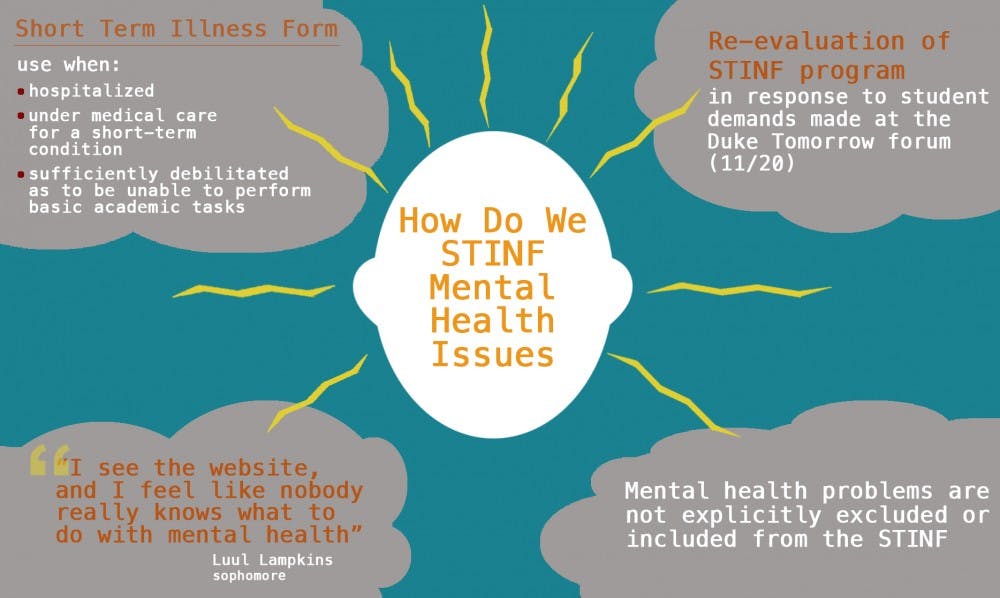Although physical health problems are accepted as reasons to submit a Short-Term Illness Notification Form, it remains unclear whether STINFs can be used for mental health illnesses.
Students at the Duke Tomorrow forum Nov. 20 demanded the option to cite mental health on a STINF. Although the demands specify that the “mental health trauma” covered by the STINF can be caused by “racial incidents on campus,” many have considered the usefulness of this option for other mental health illnesses. In light of these demands, academic deans will be re-evaluating the entire STINF program next semester and in Summer 2016.
“From the perspective of our academic deans, we consider diagnosed mental illness like any other medical challenge that can leave students incapacitated at times and functional at other times,” said Lee Baker, dean of academic affairs for Trinity College of Arts and Sciences. “Students with diagnosed mental health challenges should and do utilize these support structures to get the support they need.”
According to the the University’s Academic Policies and Procedures website, a STINF can only be submitted for an incapacitating illness or injury for which a student is, “hospitalized, under medical care for a short-term condition or otherwise sufficiently debilitated as to be unable to perform basic academic tasks.”
Although mental health illnesses are not excluded from the STINF, they are not explicitly included either, which causes confusion about if a STINF should be used for mental health illnesses.
“I see the website, and I feel like nobody really knows what to do with mental health,” sophomore Luul Lampkins said. “It’s just a tricky topic for a lot of people, so I never feel that mental health problems will fall into that category which could be used for the STINF.”
On the other hand, Lisa Beth Bergene, associate dean for East Campus, noted that the ambiguity on the website maintains some confidentiality about the student’s condition.
“I actually like that the form is non-specific when it is sent to me,” Bergene said. “I wouldn’t want the student to be required to disclose the nature of the illness, whether it be mental or physical, due to the concern of the student’s privacy.”
Lampkins added that she has spoken to other students who agree that they would not feel comfortable using a STINF for a mental health illness.
“It’s not very tangible and there’s no way to prove [a mental health condition],” she said. “People feel that you could just say that everyday.”
Baker noted that what they want to avoid is self-diagnoses of an anxiety disorder, for example, when someone is very anxious for a test. They want students to use it, not abuse it.
“I have faith that most students would not abuse STINF both because I think students understand the trust that must exist between students and faculty but also because there is a real consequence to submitting a STINF under false pretenses,” Bergene said.
According to the American College Health Association-National College Health Assessment, more than 30 percent of all college students reported feeling “so depressed that it was difficult to function” at some time in the past year.
While Duke provides support to students with mental health illnesses, Bergene said that there is more that can be done.
She explained that a lot of effort is put into support mechanisms, such as Counseling and Psychological Services, the Women’s Center, Student Health and the Student Disability Access Office, who are constantly following up and checking in on students who have expressed concerns. Bergene also added that the area with most potential for improvement is to create a culture of care within the community.
Recently, a number of student groups have been created to address mental health, such as Peer for You, You’re Not Alone and the Me Too campaign. As reported in a Chronicle article last fall, CAPS referrals in the last 10 years have increased by more than 50 percent although the total number of hours treating students has remained relatively constant. Duke Student Government has also partnered with CAPS to increase student awareness of mental health resources on campus and improve student access to these resources.
“The most important part right now is to let people who have mental health problems feel comfortable talking about it and actually going out to use these resources that Duke has provided,” Lampkins said.

